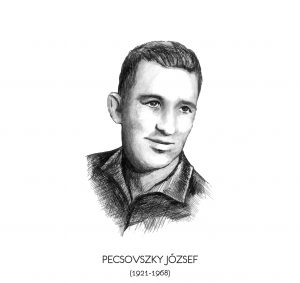 Football player, football juggler, one of the best Romanian football players.
Football player, football juggler, one of the best Romanian football players.
Considering his „football player typology,” he belongs to the same category as Alfredo Di Stefano: he is an outstanding figure of his time and, just like the Argentinean world star, he is the best everywhere on the football pitch, he assumes all the hardships, organizes details, conducts the game and scores the goal, if needed. He also plays as a goal keeper.
In Arad he reaches the climax of his sport career, and the specialists consider Pecsovszky (Perényi) József, the football player, who was born in Timisoara and had acquired the football game’s ABC in the same town, stretching along the Bega, the most talented and technical football player. He belongs to the group of football players from Transylvania, whose members were both national Romanian and Hungarian selected football members, who had won the championship in both countries.
From the 10 children of the Pecsovszky family, József is the fourth; in an interview he states: his father, a smith, who had arrived from the Gölnic mines, settled in the Szepes County, to the region of Banat, considered himself a German although he was a Slovakian. His mother, Hack Rozália, was born in Denta, a locality settled not very far from Timisoara; she was definitely a „sváb” yet she considered herself a Hungarian. Pecsovszky József, nicknamed Csala, tells the following words about himself: „I did not consider myself a German in 1943 either, although others say it would have been an „intelligent thing…”
In 1934, Pecsovszky starts to play in the Kinizsi youth football team. He plays as a member of the Kinizsi adult team’s second class in 1937, for the first time. In the spring of 1940 he is an A-category member of the Workers’ Athletic Club in Timisoara. The introduction is successful and they win the first match against the Rapid team from Bucharest (4-1). He plays only in two matches with the workers’ team, then he is confirmed by the Kinizsi team, and between 1940 and 1941 he plays as a member of this football team.
In 1941 he moves to Oradea, where he represents the main force of the NAC until 1944. In the town stretching along the Cris River, his name is changed from Pecsovszky into Perényi. This name, Perényi József, enters the history of the Hungarian football as, together with the NAC team, he wins the Hungarian Championship in 1943. In 1942 and 1943 he plays thrice in the Hungarian group of selected football players. He represents the NAC team in 77 matches at the first category of the Hungarian Championship. .
In the summer of 1944 he lives in Timisoara, he gets several contract proposals from more clubs, but instead of the ruined town settled along the Bega, he chooses Cluj, where between 1944 and 1945 he becomes one of the best Ferrar players. There is the same Pecsovszky József who plays with the UTA team from Arad between 1946 and 1951, with CCA/Steaua from Bucharest between 1952 and 1954, and again with UTA between 1955 and 1961. He takes part in 273 matches in the A-category, and scores 86 goals. As a member of the UTA and CCA teams, he wins 5 national championships, and obtains 2 Romanian Cups. Between 1945 and 1958 he participates in 32 matches with the Romanian selected group; at this encounter he scores 11 goals. At the Olympic Games in 1952 he is the member of the selected Romanian group against Hungary (2-1 on the behalf of the Hungarians).
He completes his sporting career at the age of 40, in 1961. For a year he conducts the adult UTA team, then he deals with the team of children and young people. At the end of his life he experiences a serious disease. He dies in Arad, on October 6, 1968.
Pecsovszky József represents the best Romanian football player, who represents a real legend. Given his long and successful career, he is awarded with the second rank of the Work Merit of Order; he is also the first football player who obtains the highly-qualified Master of Sports rank. One should also mention the Pecsovszky prize offered to the players belonging to the first category, with the support of the Romanian Football Players’ Society, for his name not be forgotten.
